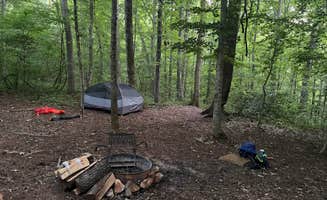Dispersed camping near Pfafftown, North Carolina offers primitive outdoor experiences in the western Piedmont region, where elevations generally range from 700-1000 feet. The area experiences four distinct seasons with hot, humid summers and mild winters. Fall camping is particularly popular when temperatures moderate and forest colors change, typically from late September through early November.
What to do
Hiking exploration: At Birkhead Mountain Wilderness Area, multiple trail loops allow for day hikes or overnight backpacking trips. The wilderness area features nearly 6,000 acres of protected forest with trails ranging from 2-8 miles in length. A camper noted the area has "plenty of creeks" providing natural water sources, though all water requires treatment before consumption.
Paddling access: Shallow Ford Natural Area offers boat-in camping sites along the Haw River. Paddlers can access the area via multiple put-in points, with the primary access at 1955 Gerringer Mill Road in Elon. The area serves as a convenient stopping point for multi-day paddling trips, and one visitor mentioned it's "on the Mountains to Sea Trail for those that are doing that."
Wildlife observation: Dawn and dusk provide optimal wildlife viewing opportunities at most primitive sites. Bring binoculars for spotting various bird species including woodpeckers, wild turkeys, and seasonal migrants. According to a camper at Shallow Ford, visitors can expect to see "lots of birds and squirrels" throughout their stay.
What campers like
Natural quiet: The remote settings of these primitive campsites provide notable sound isolation from urban areas. A camper at Robbins Branch Trail appreciated the lack of highway noise and light pollution, allowing for clear night sky viewing when weather permits.
Established fire rings: Some primitive sites come with pre-existing fire rings, reducing the need to create new impact areas. A Shallow Ford camper mentioned, "It is pretty flat for your tent and there are fire rings. Someone left me a bundle of wood."
Shade coverage: The mature forest canopy throughout the region provides natural temperature regulation. Campers at primitive sites benefit from "lots of shade" as one Shallow Ford visitor reported, which proves especially valuable during summer months when temperatures frequently exceed 85°F.
What you should know
Water availability: No potable water exists at any of these dispersed camping locations. Campers must either pack in all necessary water or bring filtration/purification equipment for treating natural sources. The Birkhead Mountain area has multiple creek crossings, but flow rates vary seasonally and can diminish during late summer droughts.
Navigation challenges: Trail marking quality varies significantly between areas. One Birkhead Mountain visitor warned that trails are "not marked the best... signs at intersections," suggesting campers bring detailed maps or GPS devices with pre-loaded routes.
Leave No Trace requirements: All dispersed camping locations require complete pack-out of all trash and waste. No facilities exist for garbage disposal, and improper waste disposal damages these sensitive environments. Sites with established fire rings should be used when available to minimize ground impact.
Tips for camping with families
Gradual introduction: For families new to primitive camping, consider starting with Shallow Ford Natural Area where the terrain is "pretty flat for your tent" and natural features provide built-in entertainment. The sound of "the river in the background" creates natural white noise that helps many children sleep in unfamiliar settings.
Wildlife education: Bring field guides for identifying local plants, trees, and animal tracks. Challenge children to locate and identify specific species rather than focusing on larger animals that may remain hidden. The abundant small wildlife provides constant observation opportunities.
Weather preparation: Temperature swings can be significant in this region, particularly in spring and fall when overnight lows can drop 30°F below daytime highs. Pack additional layers for children who may not recognize temperature discomfort before it becomes problematic.
Tips from RVers
Size limitations: Most dispersed camping areas near Pfafftown have significant size restrictions for vehicles. Small campervans and truck campers under 20 feet can access more areas than larger RVs. Robbins Branch Trail permits limited RV access but lacks hookups or developed parking pads.
Ground conditions: Check recent weather patterns before attempting access with any recreational vehicle. The clay-rich soils in this region become extremely slippery when wet, creating hazardous driving conditions even for 4WD vehicles. Roads may remain impassable for days following significant rainfall.
Generator restrictions: Most primitive areas prohibit generator use to maintain the natural soundscape. RVers should prepare for dry camping with sufficient battery power or solar capacity for essential needs. Plan stays around battery limitations or select developed campgrounds if power requirements are significant.


